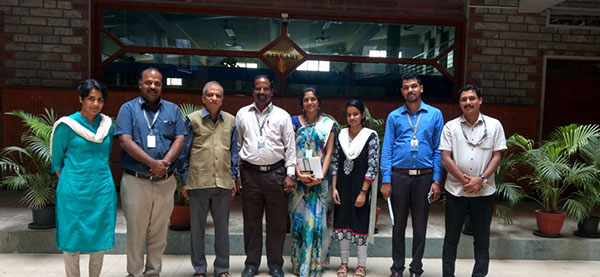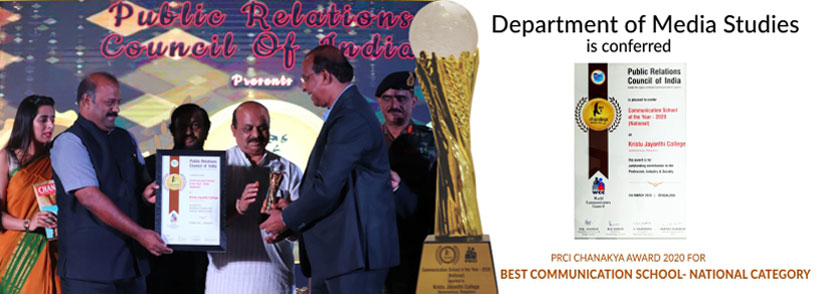
Faculty Development Programme
Empowering Media Educators: Faculty Development Programme on Transmedia Storytelling
The Department of Media Studies organised Faculty Development Programme (FDP) on Transmedia Storytelling, a comprehensive initiative aimed at equipping media studies faculty members with advanced skills in media production from May 30 to June 07, 2024. The FDP featured a series of expert-led sessions, each focusing on critical aspects of media storytelling and production.
Session 1: Narratives of the Everyday
Resource Person: Prof. Swati Dandekar, Dean, Film Programmes, Srishti Manipal Institute of Art, Design, and Technology
Prof. Swati Dandekar emphasized the critical role of observation in creating compelling narratives. She articulated that keen observation allows storytellers to capture the essence of their subjects, leading to more authentic and relatable stories. By paying attention to the subtleties and nuances of everyday life, media professionals can craft narratives that resonate deeply with their audiences. Prof. Dandekar also highlighted how ordinary events and experiences, often overlooked, can be transformed into powerful narratives, encouraging participants to look beyond the obvious and find stories in the mundane.
Session 2: Mastering Cinematography Techniques
Resource Person: Mr. Aby Augustine, Assistant Professor, Department of Media Studies, Kristu Jayanti College
The second session offered an in-depth exploration of the technical and creative facets of cinematography. Mr. Aby Augustine provided expert guidance on advanced camera techniques, lighting setups, and visual storytelling methods, enhancing the faculty's ability to teach and implement high-quality cinematographic practices in their work.
Session 3: Mastering Photography Techniques
Resource Person: Mr. Harish Kumar S., Professional Photographer
Led by professional photographer Mr. Harish Kumar S., this hands-on session covered advanced photography techniques crucial for enriching transmedia narratives. The session included practical demonstrations and provided participants with the opportunity to gain hands-on experience. This training significantly enhanced the faculty's media production skills and their ability to integrate photography into transmedia storytelling.
Session 4: Mastering the Art of Newsletter Design
Resource Person: Ms. Namitha Raveendranathan, Metaverse Innovation Analyst and Designer, Shell
Ms. Namitha Raveendranathan enlightened the faculty on creating newsletters that attract the target audience. She covered essential design principles and layout elements, emphasizing layout aesthetics. The session concluded with a hands-on experience in Adobe InDesign, allowing participants to apply their newfound knowledge practically. This training not only enhances the faculty's skills but also has significant implications for student training, preparing them for real-world media production tasks with proficiency in industry-standard software.
Session 5: Mastering Audio and Video Editing
Resource Person: Mr. Bino Joseph, Associate Professor, Department of Computer Science (PG) Kristu Jayanti College
Mr. Bino Joseph focused on the critical aspects of audio and video editing. He delved into understanding the audio spectrum, explaining how to layer audio effectively and transform dry audio to wet audio for a more polished final product. The session concluded with a hands-on experience in Adobe Audition, allowing participants to practically apply their new skills. This training enhances the faculty's expertise while significantly benefiting student training, ensuring students are well-prepared for industry demands with proficiency in tools like Adobe Audition.
Session 06: Advanced Video Editing
Resource Persons: Mr. Bino Joseph and Mr. Aby Augustine
The concluding session, led by Bino Joseph and Aby Augustine, was dedicated to video editing using Adobe Premiere Pro. The session provided a comprehensive overview of the software and practical insights into its tools and processes. Participants were guided through both basic and advanced editing techniques, with hands-on experience that allowed them to apply their newfound knowledge in real-time.
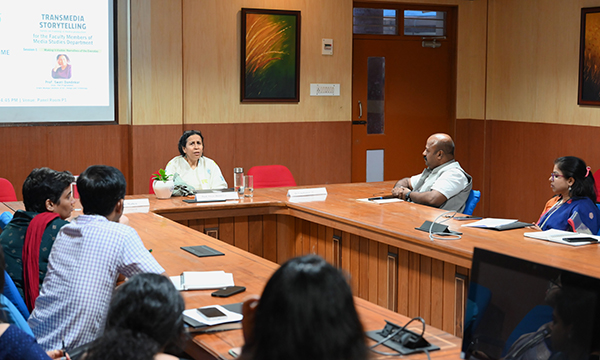
7-days FDP on Qualitative Research Methods
The Department of Media Studies, Kristu Jayanti College (Autonomous), Bengaluru inaugurated a 7-day Faculty Development Programme (FDP) on Qualitative Research Methods for Social Sciences and Humanities faculty members. The inaugural function was graced by Prof. K G Suresh, Vice-Chancellor, Makhanlal Chaturvedi National University of Journalism and Communication, Bhopal. Prof. K G Suresh was the former Director-General of Indian Institute of Mass Communication (IIMC), New Delhi. He is a senior journalist and also an active member of ICSSR (Indian Council of Social Science Research).
The inauguration ceremony began with a prayer song led by the Kristu Jayanti College choir which was followed by the welcome address. In the welcome address, Dr Juby Thomas, Coordinator, Department of Media Studies (PG) cordially welcome the dignitaries and participants to the FDP.
Rev. Fr. Dr. Augustine George, Principal, Kristu Jayanti College proposed the presidential address. In the presidential address, he thanked the chief guest for his utmost hospitality towards the students and faculty members of Kristu Jayanti College during their industrial visit to IIMC (Indian Institute of Mass Communication), New Delhi.
Fr. Dr. Augustine George applauded the vision of the Department of Media Studies for organising programmes that influence society and promote democracy. He highlighted the importance of research culture in KJC and the efforts to promote more research with a futuristic vision. He gave his blessings and appreciation to all the participants for a fruitful experience.
The Chief Guest of the programme, Professor K G Suresh gave the keynote address. He applauded the teachers of the country, for their effortless adaptation towards the new normal. Highlighting the role of teachers, he said that teachers are among the frontline heroes who have effortlessly carried out their service even in these tough times.
Expressing his concern on the rise of infodemic during the pandemic, Prof. K G Suresh said there has always been misinformation, disinformation and propaganda but an overdose of information where the consumer is unable to differentiate between fact and fiction. He also directed the concerns raised by the United Nations and even by the Indian Prime Minister. The impact of infodemic is prevalent in our country about COVID-19 and its vaccination.
Prof. K G Suresh stressed research-oriented education under the National Education Policy (NEP) 2020 which will promote research in higher educational institutions. He also applauded the efforts of the government for giving more impetus to evidence-based research through ground-breaking policies. Prof. K G Suresh said, “Indian universities have not been part of global rankings as most of the universities have always focused on being teaching and learning institutions and not being research institutions.” He urged the participants to conduct quality research to make a difference. He lamented how research has become repetitive and reduced the quality of research.
Prof. K G Suresh gave explanations to many questions on research that the idea is not to study something which is already known, the idea is to bring out newer aspects that are needed, which are not known. He asked the participants to do solution-oriented research instead of problem-centric research. According to Prof. Suresh, “the hallmark of any good research paper is how many times it has been cited – nationally and internationally.” He spoke about minor and major projects funded by ICSSR and encouraged researchers to join the fellowship programmes.
Dr Juby Thomas, coordinator of the Department of Media Studies (PG) concluded the session with a vote of thanks. The inaugural session was closed with the Kristu Jayanti College anthem led by the KJC choir.

Faculty Development Programme on Corpus-Assisted Discourse Analysis
The Department of Media Studies (PG), Kristu Jayanti College (Autonomous), Bengaluru, organized one-day Faculty Development Programme (FDP) on Corpus-Assisted Discourse Analysis for the faculty members of department of Media Studies and English on 21 September 2020, with the support of college management team. The objective of conducting the FDP was to understand the applications of discourse analysis in communication research and to fill the gap of the practical aspects of conducting discourse analysis.
Dr. Natalia Knoblock, Associate Professor of English at Saginaw Valley State University, Michigan, USA, was the resource person of the FDP. More than 40 participants, including internal faculty members and faculty members from other universities attended the programme.
Dr. Knoblock covered a wide range of the fundamental concepts of discourse analysis, critical discourse analysis and practical aspects of the research methods. She started the session with a question on how to use discourse analysis as a critique of social life. “Communication scholars can study all forms of communication- spoken and written text to understand power, dominance, inequality and biases that exist in our society,’ said Dr. Natalia Knoblock.
She added, ‘We, as academics, need to write research papers and talk about it (societal issue)’.
During the session, Dr. Knoblock’s presentation of her research findings on xenophobia in online communication, one among her research interests, drew much attention of the participants. She also shared a number of useful internet resources such as Sketch Engine and Ant Conc to conduct computational corpus-assisted discourse analysis.
The programme included resource person’s presentation of theories and concepts of discourse analysis and discussion on corpus-assisted discourse analysis. It concluded with an interactive question and answer session. During the Q & A session, one of the participant expressed her view as ‘a very insightful session’. Feedback of the participants was collected at the end of the programme using Google Feedback Form.
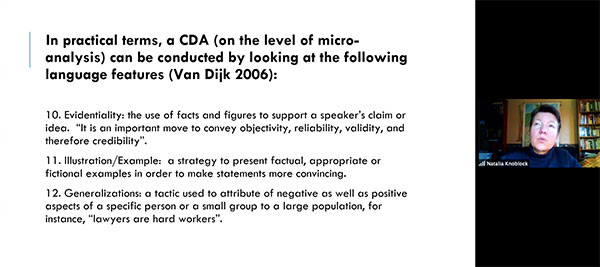
The Department of Journalism and Mass Communication (PG) organized Five days online Faculty Development Program on various topics.
Session 1. Shri. Rajesh Padmar, Social Activist Bangalore spoke on different platforms and ethical issues involved in social media. He spoke on how one should be ethical while forwarding the messages that comes through phone via Whatsapp, Facebook, Twitter and other platforms. He also mentioned that one should go through the news and check for its credibility through sources and verify if it is fake news or authentic and also pointed out about the fake accounts and its importance to know about the authentic accounts.
Session 2: Ms. Anita Rathnam, Executive Director, Samvada gave an enriching talk on how one should understand the classroom and youth – hood and its importance in the present scenario. She mentioned that it is of great need to understand the diversified classroom and demonstrating equity and inclusion while teaching a set of students. Further, she explicated how a teacher should deal with complexity of youth – hood to attain their interest on the subject and studies as a whole.
Session 3: Dr. Anil Pinto, Registrar, Christ University enhanced the participants knowledge on the various possibilities in Media research and its importance. Mr. Pinto mentioned that there is a greater need of multi-disciplinary researches to have a greater and deeper understanding of the subject.
Session 4: Dr. Mercy Pushpalatha, former Principal indeed delivered an excellent talk on how to develop an effective curriculum. She mentioned that teachers are now not just teacher but then facilitators who facilitates the need of the students for their holistic development. She critically evaluated and explained the elements of an effective curriculum. She mentioned that a curriculum must be based on learning outcomes, it should be constructive and operational in nature.
Session 5: Fr. Stanley, President, Signis, India certainly delivered an interesting talk on Newsroom debates pros and cons. He gave a very detailed picture on early stages of newsroom and how it geared up after the invention of Television in the world. He gave wide range of understanding on how newsroom debates are influencing people in setting up a stand on various issues. He mentioned that today’s news room debates are more emotional play, with personal bias.

Faculty Development Programme on Media and Journalism
The Department of Journalism and Mass Communication of Kristu Jayanti College organised a five-day FDP programme for media academicians from May 12-16, 2020. The programme was designed to provide insight and train teachers about the trends in media education and media profession.
The five-day session included five experts detailing various aspects of media education today. Shri. Rajesh Padmar, social activities spoke about Social Media and Ethics on the first. He spoke about various tools to verify and counter misleading information on social media platforms.
The following sessions by Ms Anita Ratnam, ED, Samvada focused on understanding classroom and youthhood. Her talk focused on various means to engage youth and be empathetic towards them. Dr Anil Pinto, Registrar, Christ (Deemed to be) University spoke about ‘Research as the social responsibility of media academicians’. His session focused on different challenges in media research. A session on Effective Curriculum development for media Studies was taken by Dr Mercy Pushpalatha, Former Principal, Lady Doak College. The last session was taken by Fr Stanley, President, Signis. He explained in detail about the history of Indian Newsroom debates and its pros and cons.
Academicians and Media experts shared their expertise with the audience. The five-day online FDP had more than 200 participants from different parts of the country. The programme enriched and updated media academicians and Scholars about trends and changes in the media field and journalism education.
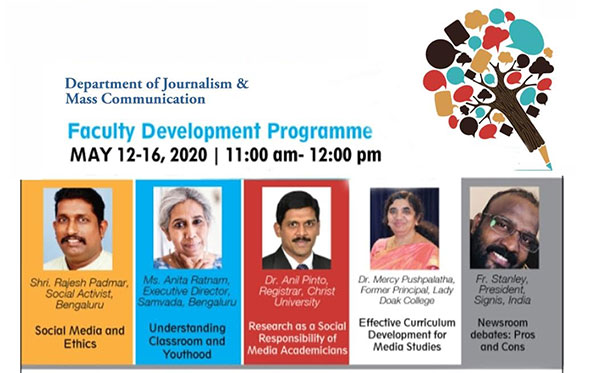
Faculty Development Programme
Department of Journalism and Mass Communication organised a three-day Faculty Development Programme [FDP] on ‘essentials for live and recorded television programme productions’ from August 7- 9, 2019 for the faculty members of Department of Journalism and Mass Communication.
The sessions included - Functionalities of Video Camera and Mounting Equipment, Camera Audio consoles and operations, Audio mixer and its operations, Fundamentals of composition, Recording A/V content, A/V editing, LIVE Streaming- Knowing the set-up, Multi cam production [layout], Basics of vision mixing using video switcher and Live streaming.

Faculty Development Programme
The Department of Journalism and Mass Communication organised one-day Faculty Development Programme on ‘Research in Media and Communication’ for Journalism faculty members on January 16, 2018. Prof K V Nagaraj, Former Vice-Chancellor, Assam Central University was the resource person. He addressed the importance of quality media research, publishing research scholar papers in International quality journals, research language and enhancing reputation as a researcher. The session focused on different formats of qualitative and quantitative research.
